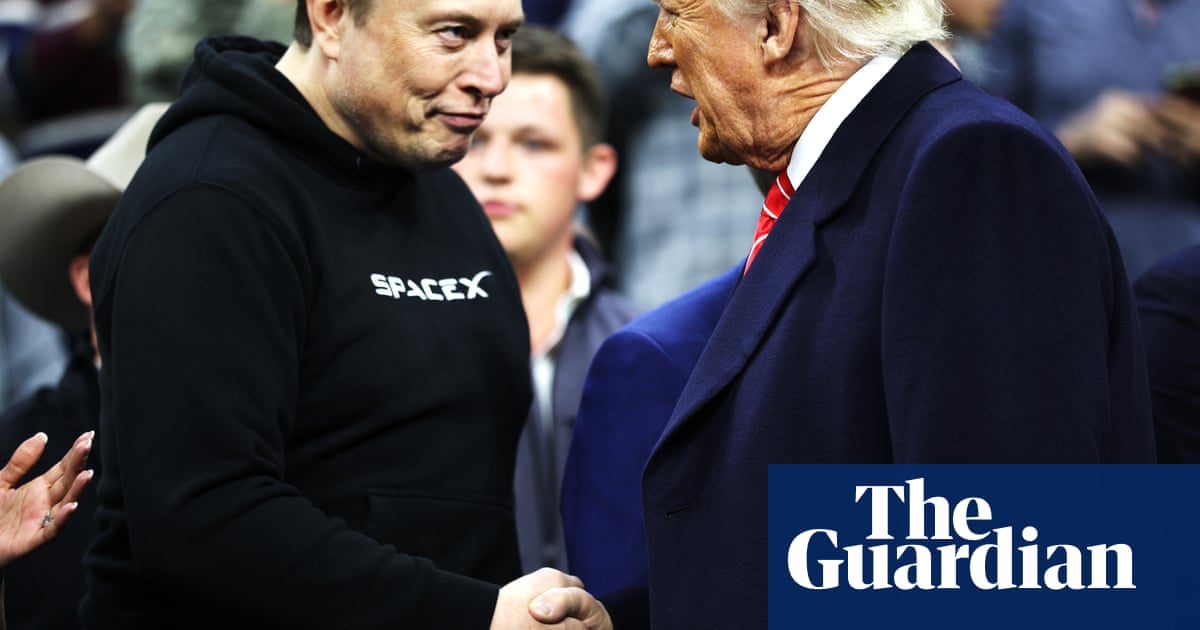After a year of effusive praise and expressions of love for each other,Elon MuskandDonald Trumpexploded their political partnership in dramatic fashion this week. The highly public split included, among other highlights, the world’s richest person accusing the president of the United States of associating with a notorious sex offender. Trump said Musk had “lost his mind”.
As Musk and Trump traded insults, each on his own social network, they also issued threats with tangible consequences. Trump suggested that he could cancel all of Musk’s government contracts and subsidies – “the best way to save money”, he posted – a move that would have devastating consequences not only on the tech billionaire’s companies but also on the federal agencies that have come to depend on them. Musk responded by announcing thathe would begin decommissioningthe SpaceX Dragon spacecraft that Nasa relies on for transport missions, although he later reversed the decision.
While the ongoing episode had the tenor of sensational reality TV, the fight between Trump and Musk once again exposed the danger of putting key public goods in the hands of private companies controlled by erratic billionaires. It highlighted how something like space travel, once a vaunted and collective national enterprise, can now be almost entirely derailed by the emotional whims of a single person.
Musk and Trump’s partnership had already fueled months of concern about corruption and calls for investigations into the Tesla CEO’s use of his position in government to benefit his companies. The breakup has highlighted another risk of Musk’s deep ties with the government, where the services that he provides can now become collateral damage in interpersonal disputes. Tens of billions of dollars hang in the balance of their fight.
The messy, public way that the clash has played out also serves as a reminder of how unpredictable their decision-making can be. Musk’s vow to sideline SpaceX’s spacecraft and his reversal, without which the US would have immediately been prevented from reaching the International Space Station, appeared, for instance, as an emotional lash-out amid a string of other insults against Trump, and it was nearly impossible to discern whether he was serious.
“In light of the President’s statement about cancellation of my government contracts, @SpaceX will begin decommissioning its Dragon spacecraft immediately,” Musk posted without warning on Thursday.
“Good advice. Ok, we won’t decommission Dragon,” Musk followed up less than a day later, responding to an anonymous user with around 5,000 followers who said he should “cool off and take a step back for a couple days”.
If Musk and Trump’s fight ends up disrupting government services or further turning them into political leverage, it will not have come without warning. Ever since Musk refused in 2023 tolet Ukraine use Starlinkin Crimea to launch a surprise attack against Russian forces, governments have dealt with the uncomfortable reality of Musk’s control over global infrastructure. Musk’s claim thathe could hobbleUkraine’s “entire front line” by turning off Starlink caused a diplomatic incident earlier this year. Meanwhile, European governments have recentlyrushed to find alternativesto Starlink amid concerns over Musk’s unpredictability.
While Musk provoked foreign governments and acted as an unaccountable global power broker, the US has by contrast continued to hand him contracts and increase its dependence on his companies. Space operations in particular have become practically synonymous with Musk.
Sign up toTechScape
A weekly dive in to how technology is shaping our lives
after newsletter promotion
Since SpaceX won its first Nasa contract in 2006, the government has awarded about $15bn worth of contracts to the company and come to depend on it for ferrying astronauts and cargo into space. Nasa has also contracted SpaceX for its planned crewed mission to the moon, as well as a mission to explore one of Saturn’s moons. Last year, the agency turned to SpaceX when it needed torescue two astronautsstuck on the ISS.
The government’s reliance on Musk’s empire also extends beyond Nasa. The Pentagon has extensive contracts with Musk, using SpaceX to launch intelligence satellites. SpaceX wasalso the frontrunnerin the Trump administration’s plans to build a “Golden Dome” missile defense shield, which has become a US national defense priority. Starlink, Musk’s satellite communications service, had also made inroads into the government to the point that it was installed this year at the White House.
Musk is still accountable to market forces and the investors backing his companies, as was made evident on Thursday after Tesla’s shares plunged roughly 14% during his dustup with Trump. Musk has previously stated that he is willing to lose money over his ideology, however, and his immense wealth somewhat insulates him against even large shocks to his companies. When Tesla’s shares dropped on Thursday, it wiped about $34bn off his total net worth in a single day – yet he remained the world’s richest person by a gap of more than $90bn.
The extensive reliance on Musk and privatization of government services has always drawn criticism from ethics watchdogs and some aerospace or defense industry experts, but it appears especially risky now that Musk has threatened to hold certain services hostage. It has also served as a counterpoint to the project of slashing and privatizing the federal government that Musk spent his tenure with the Trump administration carrying out. Musk has furiously campaigned against bureaucracy, courts and regulators as impediments to getting things done, but these also exist as a bulwark against exactly the kind of unaccountable personal power and erratic whims that both he and Trump put on display during their clash.
